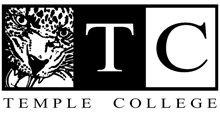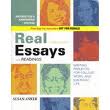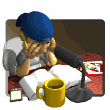|
|
| First one-third of evaluation system (tests, quizzes, other) 2% each quiz |
Quizzes:
Such as vocabulary, grammar, usage, and punctuation. Basically, there are fourteen quizzes, and each one is worth 2% of the
final course grade, for a total of 28% |
| First one-third of evaluation system (tests, quizzes, other) |
5% Participation:
see the "Participation Grading" section of this syllabus. Carries more weight, at 5%, than an individual quiz. |
| Second one-third of evaluation system (written essays) 11% |
Essay 1: Comparison-ContrastWord-count requirement:
450 to 550 words in exactly five paragraphs.
Due date: 6/23/10 Due by 5:50 p.m., in the D2L drop box, on the due date; if the drop box records a 5:51 p.m. submission, the paper is one calendar day late. Expect to lose
10% for each calendar day the paper is turned in late. Must be turned in as a MS Word doc or docx file. |
| Second one-third of evaluation system (written essays) 11% |
Essay 2: Cause-Effect EssayWord-count requirement:
450 to 550 words in exactly five paragraphs. Due date: 7/7/10 by 5:50 p.m., in the D2L drop box, on the due date; if the drop box records a 5:51 p.m. submission, the paper is one
calendar day late. Expect to lose 10% for each calendar day the paper is turned in late. Must be turned in as a MS Word doc or docx file. |
| Second one-third of evaluation system (written essays) 11% |
Essay 3: ArgumentativeWord-count requirement:
450 to 550 words in exactly five paragraphs.
Due date: 7/21/10. Due by 5:50 p.m., in the D2L drop box, on the due date; if the drop box records a 5:51 p.m. submission, the paper is one calendar day late. Expect to lose
10% for each calendar day the paper is turned in late. After four days late (to the minute), the paper will not be accepted, and under the "Late Work/Make-up Policy" section
of this syllabus, you will have failed this course. Must be turned in as a MS Word doc or docx file. Essay 3 is not returned, nor is feedback given. |
| Third one-third of evaluation system. 33%
|
Final Examination:
participation is mandatory. Remember that the Final Examination is worth 33% of your final course grade. The
Final Examination is not returned, nor is feedback given. |
| 1% Course Management Skills |
Course Management Skills: I will assign a grade based on your overall course
managementfor example, the timeliness of all submissions. Other factors, such as uploading the correct file types, attendance, and participation play a role, at my
discretion. At 5:51 p.m. on the due date, the assignment turn-in time will count against you. I take no excuses regarding late submissions. You have weeks to negotiate your
assignments. Submit early. |
| Although the grades for the Pre-Test and Post-Test are not factored into students' final course grade, failure to take these tests will
result in a 2% reduction per test to the final average, so it is possible to incur a 4% penalty by not taking these tests. |
Pre-test/Post-test: Students should immediately review the "Pre-Test/Post-Test" subject heading
of this syllabus, so as to avoid a penalty. Be aware that there is a limited window of time allotted to take these tests. |


























































































































